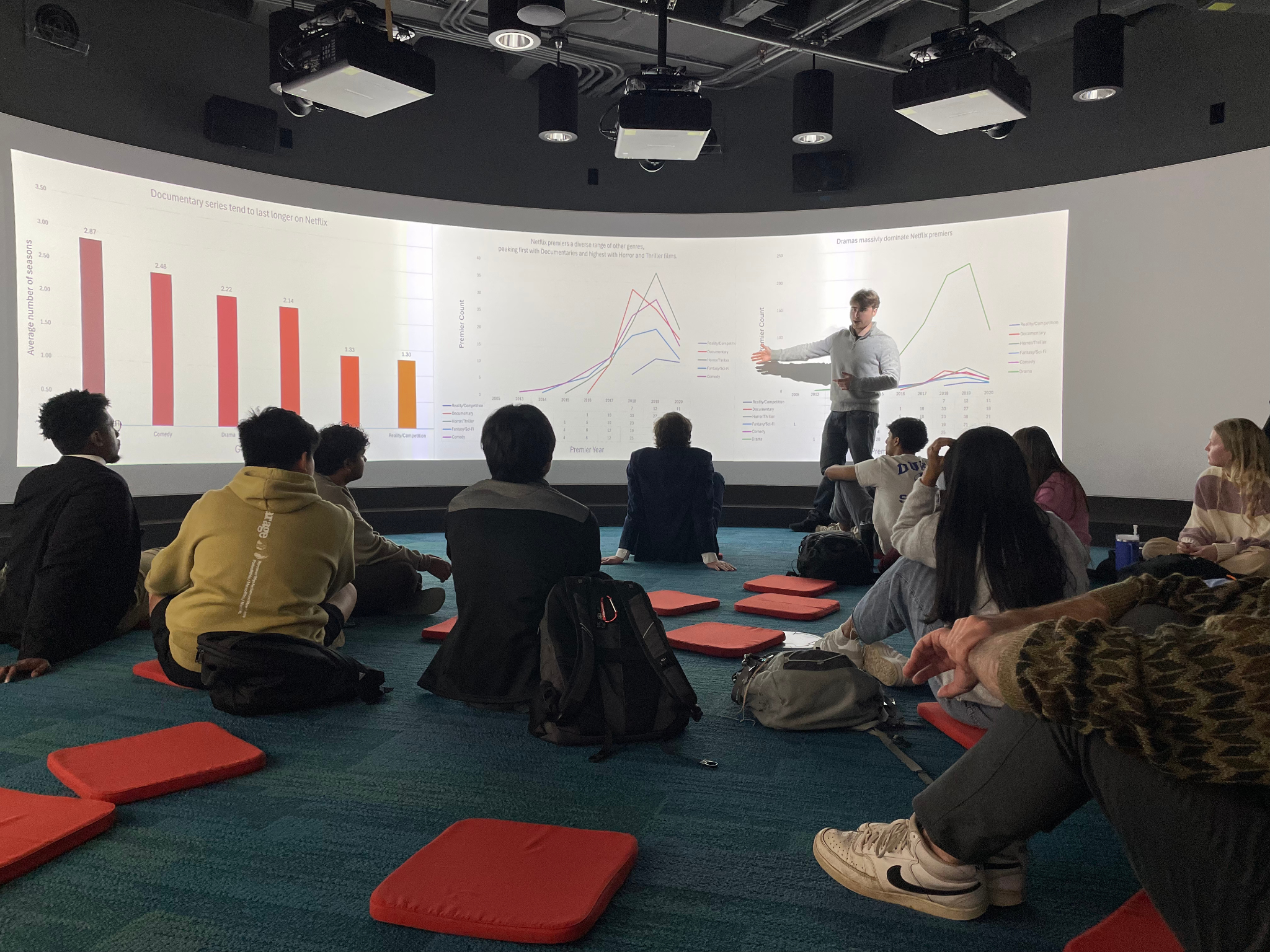
Upcoming Courses
We offer data sciences and AI courses for everyone. Find the DSA course for you.
Gain practical data science and AI skills in our one-credit, project-based courses. Open to all levels and disciplines, our classes emphasize hands-on learning through interactive projects that build data literacy without traditional tests or quizzes.
Fall 2025 Courses
Fall 2025 Special Topics Courses
Expand your DSA knowledge by browsing the special topics courses offered this semester. Find full course descriptions further down the page.
- DSA 295-001: Teaching with Data
- DSA 295-002: Humanistic Data Applications
- DSA 295-601: AI for Data Science: A No-Code Introduction
- DSA 495-601: Predictive Analytics for Improving Services
- DSA 495-602: Fundamentals of Large Language Models
- DSA 595-001: AI Literacy in Agriculture
- DSA 595-002: R for Biological Research
200 – 295 level courses – No prerequisites
DSA 201: Introduction to R/Python for Data Science
Students will develop introductory skills in R and Python needed for data science. Topics include data types, data structures, control structures, good coding practices, and reproducible coding. Students will become acquainted with basic data science techniques and their implementations in R and Python. Skills acquired in this course serve as a foundation for many of the Data Science Academy classes that suggest some experience with R or Python.
Prerequisites: None
DSA 202: Introduction to Data Visualization
Visualizations can be one of the most effective means to communicate quantitative information. Students will cover the principles of effective visualization and how to interpret data displays. Students will evaluate current examples in the media and learn tools for creating static, interactive, and dynamic data displays.
Prerequisites: none
DSA 205: Data Communication
Knowing how to analyze your data is only half the job: You need to be able to present your research in a manner that your audience can understand. Presentations should be clear, engaging, and include a minimum of the jargon that can bog down discussion of scientific concepts. This course will raise your awareness of our jargon-infused everyday conversation, introduce concepts for connecting with your audience and meeting them where they are, and offer tips for clear writing and accessible design of graphs and presentation slides.
Prerequisites: None
DSA 220: Introduction to AI Ethics
Organizations leverage Artificial Intelligence (AI) to make decisions, analyze data, speed up processes, and cut costs. There are frequent consequences (both positive and negative) of the use of AI in this capacity that point to several ethical concerns. Through a semester-long qualitative research project, students will explore the ethical use of AI within their chosen industry or field of study.
Prerequisites: None
DSA 225: Data Science for Social Good
Data science offers powerful tools for addressing a multitude of societal challenges, yet it is no panacea and will require collaboration and commitment from across society to fulfill its promise. Students will investigate the growing use of data science in the social impact space, drawing from real-world examples aligned with the United Nations’ Sustainable Development Goals. These examples will span practice areas and approaches, including machine learning, natural language processing, and image recognition. Students will discuss the challenges of implementing data science for social good solutions, including considerations of community involvement, bias, & equity and identify best practices.
Prerequisites: None
DSA 235: Introduction to Data Science for Cybersecurity
The vast majority of individuals in the U.S. have been exposed to cybersecurity threats [cisa.gov]. Personal and economic effects can be devastating. Students will investigate the use of data to discover, explore, and address relevant cybersecurity use cases. Students will become familiar with fundamental approaches to tackling common cybersecurity problems using Python.
Prerequisites: None
DSA 240: Measuring Success
Students will explore the crucial interplay between user experience (UX), data analysis, and software success. Through comprehensive usability testing, students will gain experience in analyzing user needs and feedback, and will directly link these insights to the overall success of software projects. Students will utilize data analysis and visualization techniques applied to UX metrics to clearly articulate a detailed understanding of user interactions and satisfaction. Topics include software efficacy, user retention, iterative testing, and more, with a focus on effective communication and stakeholder engagement. Students will use techniques from the class and engage directly with users to develop inclusive solutions for diverse user groups and guide data-driven enhancements in the software industry.
Prerequisites: None
DSA 295-001: Teaching With Data
An introduction to data science concepts and tools to prepare prospective teachers to infuse data-centric lessons into their respective subject areas. Students will develop mastery of data moves that will empower them to analyze data relevant to their subject area(s) (Social studies, Art, Foreign language, Physical education, English Language Arts, Mathematics, Science, Career and technical education) and bring data focused lessons into their curriculum.
Prerequisites: none
DSA 295 – 002: Humanistic Data Applications
Data-guided decisions require human-guided data. Students will draw alignment between data science methods and humanities-centered approaches while investigating their points of intersection and tension. Students will create digital projects involving data collection, management, visualization, physicalization, communication, and other aspects of data science workflows through this humanities lens. This course will include concepts such as data humanism and digital humanities.
Prerequisites: None
DSA 295 – 601: AI for Data Science: A No-Code Introduction
An accessible introduction to artificial intelligence, focusing on applications in data science workflows. Students will explore AI’s potential for enhancing data-driven insights, automating processes, and solving real-world problems. Through interactive, no-code tools, students will gain foundational knowledge of AI concepts while engaging with practical applications.
Prerequisites: None
400 – 495 level courses – Skill-based prerequisites
DSA 405: Data Wrangling and Web Scraping
Finding, cleaning, and preparing data is often required before conducting any data analysis. Data wrangling often accounts for the majority of the time spent working with data and learning these concepts is fundamental to the data science process. Students will learn how to manipulate and clean data for analyses and visualizations, read data from web pages and merge multiple data sets of reasonable sizes.
Prerequisites: Students should enter the course with basic knowledge of a programming language [such as R or Python].
DSA 406: Exploratory Data Analysis for Big Data
Exploratory data analysis [EDA] focuses on summarizing the main characteristics of data sets, often using visualization methods. The goal is not formal modeling or hypothesis testing, but understanding and exploring data to formulate hypotheses for further investigation. Students will use techniques of EDA and generalize those approaches to large data sets.
Prerequisites: Students should enter the course with some basic programming experience, such as experience using and familiarity with R or Python.
DSA 410: Data Internships Preparation for Social Impact
Students will prepare to apply for internships for social impact in nonprofits, governmental organizations, and community organizations. As part of this preparation, students will become familiar with tools [such as a data maturity questionnaire] that can help organizations assess their own use of data, and use assessment results to initiate conversations about the organization’s data practices and goals. Students will learn about the appropriate scope of projects for an internship, and practice some basic data management, analysis, and visualization through a mini-project utilizing data from real organizations with a focus on social impact. Additional emphases include developing and refining interviewing skills, professional and personal networks, job applications, and job selection.
Prerequisites: Some elementary data science experience that could be applied in an internship.
DSA 412: Exploring Machine Learning
Machine learning [ML] is a fundamental component of artificial intelligence. Students will deconstruct the basic ideas behind popular ML algorithms, such as logistic regression or K-means, using a projects-centered approach. Students will create projects from successful ML use cases tailored to their specific domains of interest.
Prerequisites: Students should have basic knowledge of a programming language [e.g., R, Python, or others], experience with appropriate use of data structures [e.g., lists and matrices], and flow control mechanisms, such as loops. Students should also be familiar with matrix-vector multiplication and the norm of a vector.
DSA 495-601: Predictive Analytics for Improving Services
For-profit companies, nonprofit service providers, and government agencies often use predictive analytics to improve their services. Predictive analytics harnesses historical data and may incorporate machine learning to model future outcomes. Students will explore the value, limitations, and ethical considerations of predictive analytics when used to improve services. Using their own dataset or one provided by the instructor, students will learn and apply a practical approach for planning, implementing and assessing a predictive analytics project. The instruction will highlight topics related to data preparation, model training and selection, validation, fairness, transparency, and communication of results.
Prerequisites: Students should have familiarity with R Studio and some experience using R to manipulate data and run basic descriptive statistics.
DSA 495-602: Fundamentals of Large Language Models
An introduction to the core concepts and techniques behind large language models (LLMs), focusing on the Transformer architecture and its applications. Topics include self-attention, model architectures like BERT and GPT, fine-tuning, and the computational challenges of training and deploying LLMs. Students will gain hands-on experience through coding exercises and a small project applying LLMs to a real-world task.
Prerequisites: Basic knowledge of how to create neural networks with PyTorch.
595 Level Courses: Skill-based Prerequisites, Research Readiness
DSA 595-001: AI Literacy in Agriculture
This course introduces students to the core concepts of AI, enabling technologies, foundational techniques, models, and approaches. Students will discuss what AI is, and what AI isn’t, issues of responsible use of AI in agriculture, and selecting AI methods for solving problems in agriculture. This course will feature discussion on applied AI for agriculture, AI tool chains and operations, as well as ethical and policy concerns surrounding AI. Students will work in small teams on a data-focused agriculture project to explore AI. Students will gain skills in evaluating the uses of AI in agriculture and applying AI tool chains to solve agriculture problems.
Prerequisites: Basic familiarity with programming may prove helpful for certain (optional) topics.
DSA 595 – 002: R for Biological Research
An introduction to the R programming environment geared towards the biological sciences. Topics include installation & software setup, programming, and data exploration & analysis, with heavy focus on data visualization [graphics] within R. Students will learn analyses with a focus on shareability and reproducibility within the context of a project or mini-projects. Students may bring their own data and use case datasets will be available as well.
Prerequisites: Familiarity with biology and biological research.

Where do DSA courses count in your program?
DSA Minors and Certificates
The Data Science and AI Academy collaborates with NC State colleges to develop data science and AI minors and certificates.
Steps for Faculty/Staff Course Registration
- Step 1: Visit the NC State Tuition Waiver website for more details and instructions for Faculty/Staff
- Step 2: Apply for admission as a non-degree seeking student and get accepted (Application Fee)
- Step 3: Enroll in class – keep in mind the registration dates!
- Step 4: Fill out and submit Tuition Waiver online notification form
- Step 5: Fill out and get supervisor approval for the actual tuition waiver
- Step 6: Then you will receive and email stating that the waiver has been approved. At this point, please check your MyPack Portal to ensure you do not have any outstanding balances
Related Links
Browse related content and resources.